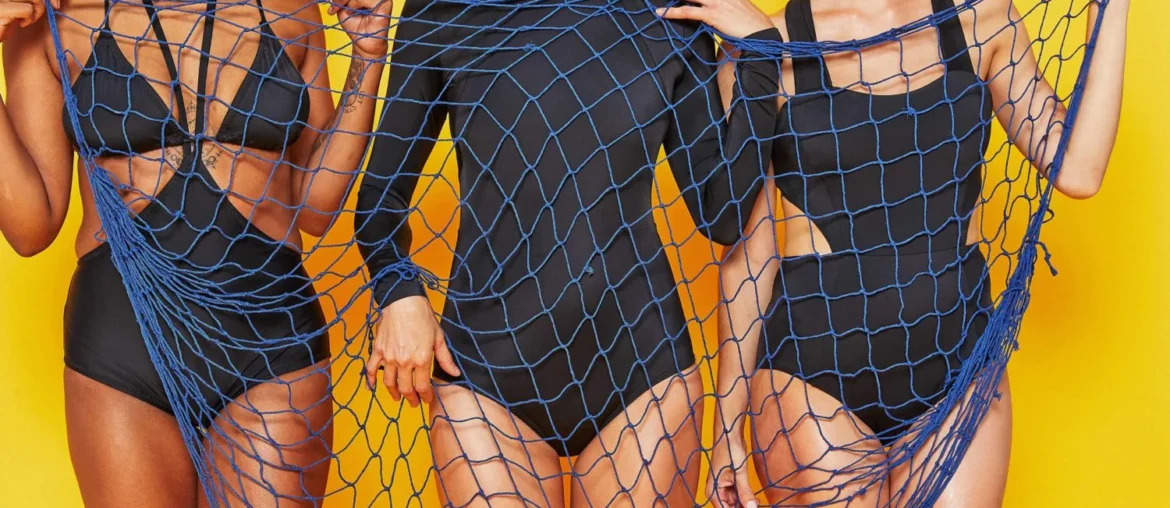Swimmers are becoming more conscious of their personal environmental impact; and their swimwear fabric choices reflect this. Slow and sustainable fashion is in, while fast fashion is out. This is especially true in the case of environmentally friendly swimwear, sustainable bathing suits, and bikinis! No one would have thought of the term “ethical swimwear” a few years ago, but now, they have become the norm. Discover the 3 best sustainable bikini fabrics for all eco-conscious swimmers in this article.
Natural Fabrics
As you are aware, unlike synthetic fabrics, natural fabrics are degradable when disposed to the environment. Even though they were used as the main swimwear fabrics in the past, synthetic fabrics have taken their place. This is because natural fabrics have many disadvantages compared to synthetic ones when they’re used for swimming.
When natural fabrics like cotton and wool become wet, they lose their form quickly. They take a long time to dry and typically retain a lot of moisture. As a result, they are heavier and less practical than synthetic alternatives. This is not a good choice for a swimming suit cloth. Unless you’re just going to sit in a sun lounger and look beautiful!
Knits and Terrys made of bamboo and cotton are frequently utilized in retro-style swimwear. They have the 1950s-1960s or even earlier vibe about them. Why? Because elastane was invented in the 1960s, everything made before then couldn’t reach the stretchy quality that came later.
All in all, natural fibers are not an ideal choice for swimwear that is supposed to be worn for swimming in general.
REPREVE Fabric
REPREVE is a recycled plastic bottle-based performance fabric. REPREVE employs a tracing tool that checks recycled content claims to ensure the recycled content in their textiles.
Unifi, the firm behind REPREVE, is a worldwide textile solutions company that has recycled over 16 billion plastic bottles to date, with a target of recycling 20 billion by 2020.
REPREVE’s Production Process
Before being transferred to the REPREVE recycling center – one of the most advanced recycling facilities in the United States — recycled post-consumer plastic bottles are collected, sorted, baled, cleaned, and cut into flakes. The bottle flakes are transformed into REPREVE chips at the factory and stored in gigantic silos, each of which stores the equivalent of 27 million recycled bottles. REPREVE fiber is made by blending, melting, and extruding REPREVE chips. Moisture-wicking, heat regulation, order control, cushioning, and durability are all intrinsic performance attributes of this one-of-a-kind material.
The fiber is then turned into fabric, which is subsequently cut and sewed into a broad range of items, including apparel and automobile interiors!
Recycled Polyester Fabrics
Polyester is the polar opposite of ecologically friendly. Polyester manufacture is harmful to the environment, the air, and human health since it uses a lot of water, chemicals, and fossil fuels.
Recycled polyester, on the other hand, is significantly better for the environment than virgin polyester, emitting 75% less CO2.
When you choose recycled fabrics, you can get a lot of durability and strength for your swimwear, much more so than your regular polyester. What’s more, with recycled fabrics, you can help reduce the overall waste disposal to the environment. Recycled polyester can even decrease the need for fossil fuels in our everyday use as it doesn’t require new petroleum for its production. As the fashion industry uses this type of fabric more and more, it will become less dependent on fossil fuels in general.
Faithful the Brand
Swimwear brand like Faithfull the Brand is one of the main contributors to the movement of using recycled polyester, as well as other sustainable fabrics.
Sarah-Jane Abrahams and Helle Them-Enger, co-founders of FAITHFULL THE BRAND, discuss what sustainability means to them personally and professionally, how the brand is integrating social and environmentally responsible practices, and why it’s critical that they continue to produce and manufacture locally in Bali, Indonesia.
They integrate their principles into their everyday business processes, with a particular focus on environmental stewardship, community assistance, and supplier chain transparency. Weekly sustainability meetings with their staff have been instituted as progress milestones to ensure they are on track with sustainable swimwear production.
By partnering with local small businesses, they reduce carbon footprint while also making some of the finest bikinis out there. They prioritize handmade, artisanal qualities in their garments, making them one of the most environmentally conscious stores.
If you’re in need of searching for new bikinis for your summer vacations, get one of their latest bikini models. Also, you can get a better price when using one of our Faithfull the Brand AU coupons!
Summary
Fabrics made from plastic, such as nylon and polyester, release harmful microplastics into our seas. Even though traditional synthetic fabrics aren’t eco-friendly, designers and customers have the power to change things! Because the future of sustainable materials is unclear, it’s crucial to keep our eyes peeled for new possibilities.
Believe it or not, progress will come from advanced research conducted in laboratories all across the world. Bio-nylon made from plant oils is now undergoing exciting research. This product will be the first 100% sustainable swimsuit fabric on the market when it is finished and ready to be rolled out! It’ll be a few years before it happens. But when it’s finished, it’ll be a game-changer for the industry of sustainable swimsuit textiles.









